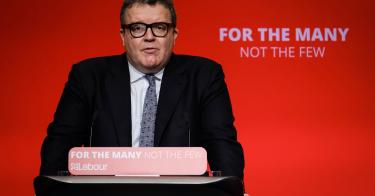Tom Watson is going on a hunger strike. Writing in the Guardian, the deputy leader of the Labour Party announced that he was taking the action “in solidarity” with two hunger-striking detainees at Guantanamo Bay. Watson claims that they “are being slowly starved to death by President Trump.”
The timing of the announcement is curious. It came just days after Watson informed readers of his newsletter that he was embarking on a diet in an attempt to slim down.
At the time, political observers speculated that Watson was getting in better physical shape for a possible future leadership bid. Now the leader would have us believe that his slimming exercise has, in the words of Ron Burgundy, “escalated quickly”—and for a CAUSE.
Still, let us park the cynicism and assume Watson’s hunger strike is authentic. Who are the men Watson is backing? His Guardian op-ed does not say much other than assert that these detainees “have faced grave injustice” and are “among the most powerless in the world.” Media reporting on this story hardly provides further clarity. In the Telegraph, for example, we learn nothing more of the detainees other than they “have used the materials they could find in Guantánamo to create art, which is displayed online.” How helpful.
Yet a glance at U.S. intelligence files on these men provides some of the context about these detainees—information that Watson felt unnecessary to mention.
First up is Mohammed Ahmad Ghulam Rabbani. Originally from Saudi Arabia, Rabbani in 1994 trained at Khalden camp in Afghanistan. This is the same camp that tutored at least three of the 9/11 hijackers and shoe-bomber Richard Reid.
Rabbani met Osama bin Laden in 1997 and, at bin Laden’s instruction, assisted terrorists who were traveling between Pakistan and Afghanistan. Rabbani then went on to work directly for Abu Hafs al-Masri (al-Qaeda’s top military commander, killed in a U.S. airstrike in November 2001) and Khalid Sheikh Mohammed (al-Qaeda’s external operations planner and the chief architect of 9/11).
Then there is Khaled Ahmad, a Yemeni member of al-Qaeda (meaning he had sworn an oath of loyalty to bin Laden). In 1999, he journeyed to Afghanistan to receive terrorist training at al-Farouq, the al-Qaeda camp where at least seven of the 9/11 hijackers trained. He did so under the tutelage of Harun Fazul, bin Laden’s top commander in East Africa and a key planner in al-Qaeda’s 1998 US embassy bombings in Kenya and Nairobi.
Ahmad eventually provided weapons and explosives training, including how to fire surface-to-air missiles, at al-Farouq. After 9/11, he fought against the U.S. and its allies at Tora Bora, the cave complex to which al-Qaeda retreated in the face of U.S. bombing.
These men’s inextricable ties to al-Qaeda are no surprise. Both Democratic and Republican administrations have assessed those still detained at Guantanamo as being too dangerous to release. They are also impossible to try, which is Watson’s demand. (For the multitude of reasons why trials are not possible, see here.)
Still, Watson’s actions are no surprise. They jibe with what has been the trajectory of the Labour party for some time. Jeremy Corbyn has historically been sympathetic to terrorists of various ideological stripes, while John McDonnell has been a consistent campaigner on Guantanamo detainees’ behalf. What an irony that such men should be so close to power at a time that the U.K.’s terror threat is at its most severe in over three decades and the nation is still dealing with the aftermath of four Islamist terror attacks in six months.
This piece originally appeared in Weekly Standard



